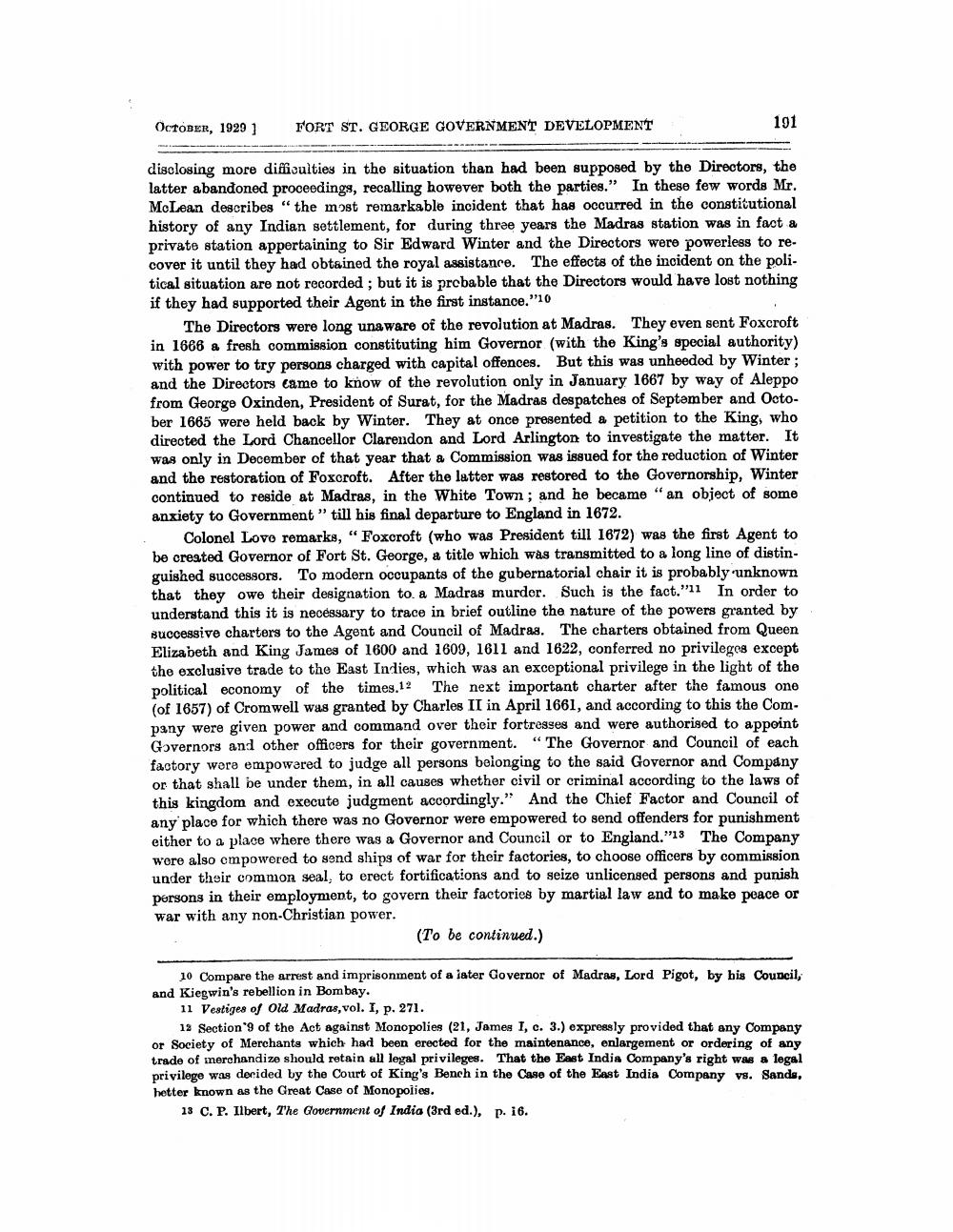________________
OCTOBER, 1929
FORT ST. GEORGE GOVERNMENT DEVELOPMENT
191
disclosing more difficulties in the situation than had been supposed by the Directors, the latter abandoned proceedings, recalling however both the parties." In these few words Mr. McLean describes “the most remarkable incident that has occurred in the constitutional history of any Indian settlement, for during three years the Madras station was in fact a private station appertaining to Sir Edward Winter and the Directors were powerless to recover it until they had obtained the royal assistance. The effects of the incident on the political situation are not recorded ; but it is probable that the Directors would have lost nothing if they had supported their Agent in the first instance."10
The Directors were long unaware of the revolution at Madras. They even sent Foxcroft in 1666 a fresh commission constituting him Governor (with the King's special authority) with power to try persons charged with capital offences. But this was unheeded by Winter ; and the Directors came to know of the revolution only in January 1667 by way of Aleppo from George Oxinden, President of Surat, for the Madras despatches of September and October 1665 were held back by Winter. They at once presented a petition to the King, who directed the Lord Chancellor Clarendon and Lord Arlington to investigate the matter. It was only in December of that year that a Commission was issued for the reduction of Winter and the restoration of Foxcroft. After the latter was restored to the Governorship, Winter continued to reside at Madras, in the White Town; and he became "an object of some anxiety to Government " till his final departure to England in 1672.
Colonel Love remarks, “Foxcroft (who was President till 1672) was the first Agent to be created Governor of Fort St. George, a title which was transmitted to a long line of distinguished successors. To modern occupants of the gubernatorial chair it is probably unknown that they owe their designation to a Madras murdor. Such is the fact."11 In order to understand this it is necessary to trace in brief outline the nature of the powers granted by successive charters to the Agent and Council of Madras. The charters obtained from Queen Elizabeth and King James of 1600 and 1609, 1611 and 1622, conferred no privileges except the exclusive trade to the East Indies, which was an exceptional privilege in the light of the political economy of the times.12 The next important charter after the famous one (of 1657) of Cromwell was granted by Charles II in April 1661, and according to this the Com. pany were given power and command over their fortresses and were authorised to appoint Governors and other officers for their government. “The Governor and Council of each factory were empowered to judge all persons belonging to the said Governor and Company or that shall be under them, in all causes whether civil or criminal according to the laws of this kingdom and execute judgment accordingly." And the Chief Factor and Council of any place for which there was no Governor were empowered to send offenders for punishment either to a place where there was a Governor and Council or to England."13 The Company were also empowered to send ships of war for their factories, to choose officers by commission under their common seal, to erect fortifications and to seize unlicensed persons and punish persons in their employment, to govern their factories by martial law and to make peace or war with any non-Christian power.
(To be continued.)
10 Compare the arrest and imprisonment of a later Governor of Madras, Lord Pigot, by his Council, and Kiegwin's rebellion in Bombay.
11 Vestiges of Old Madras, vol. I, p. 271.
13 Section"9 of the Act against Monopolies (21, James I, c. 3.) expressly provided that any Company or Society of Merchants which had been erected for the maintenance, enlargement or ordering of any trade of inerchandize should retain all legal privileges. That the East India Company's right was a legal privilege was decided by the Court of King's Bench in the Case of the East India Company vs. Sands, better known as the Great Case of Monopolies.
13 C. P. Ilbert, The Government of India (3rd ed.), p. 16.




